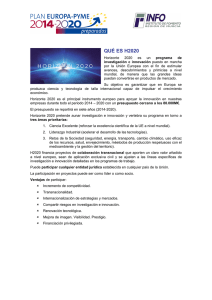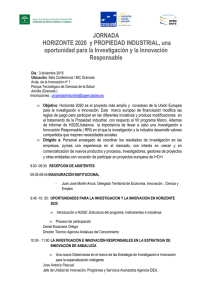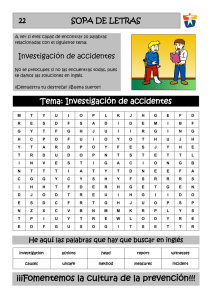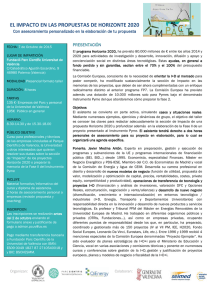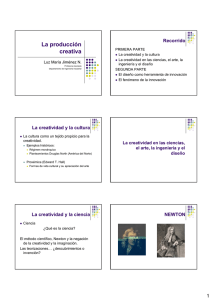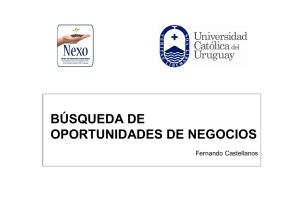Horizonte 2020 Agencia Andaluza del Conocimiento
Anuncio
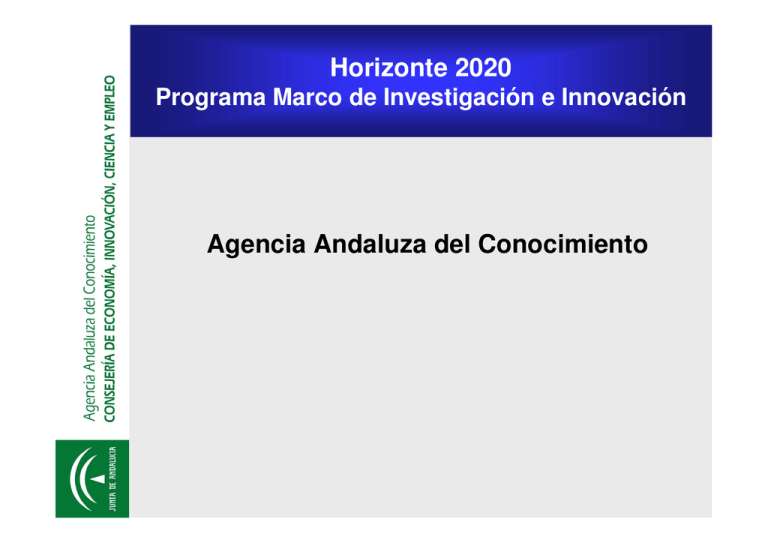
Horizonte 2020 Programa Marco de Investigación e Innovación Agencia Andaluza del Conocimiento Contenido de la presentación • • • • • • Estructura y contenidos de Horizonte 2020 Presupuestos de Horizonte 2020 Características a destacar en Horizonte 2020 Partnering en Horizonte 2020 Financiación Evaluación Agencia Andaluza del Conocimiento ¿Quiénes somos? Agencia Pública adscrita a la Consejería de Economía, Innovación, Ciencia y Empleo de la Junta de Andalucía. Responsabilidades I Formación avanzada Becas de movilidad internacional para la formación avanzada de universitarios andaluces en otros paises (becas Talentia, Talent Hub, Andalucía PostDoc) Calidad Universitaria Evaluación, acreditación y certificación de la calidad de las instituciones universitarias andaluzas su profesorado y el personal investigador Agencia Andaluza del Conocimiento ¿Quiénes somos? Agencia Pública adscrita a la Consejería de Economía, Innovación, Ciencia y Empleo de la Junta de Andalucía. Responsabilidades II Transferencia de Tecnología Promoción y fomento de la innovación tecnológica en Andalucía y de la transferencia del conocimiento Programas Internacionales Promoción de la participación de entidades de Andalucía en el VII PM y otros programas internacionales de I+D+i Prospectiva y Estudios Tecnológicos Adquisición de conocimiento sobre el estado, previsión y evolución en materia de I+D+i Agencia Andaluza del Conocimiento Agencia Andaluza del Conocimiento, tal y como recogen sus estatutos (art. 4) tiene entre sus competencias el fomento de la participación de las empresas y de los Agentes del Sistema Andaluz del Conocimiento en los programas de I+D+I de la Unión Europea. Servicios de apoyo y asesoramiento: Formación y difusión: Puntos Regionales de Contacto Análisis tecnológico de los programas Internacionales de I+D+i Detección de oportunidades de financiación Apoyo a la preparación de la propuesta Características a destacar en Horizonte 2020 Unificación de programas y simplificación de las condiciones de financiación: – 7PM / CIP / EIT – 1 tipo de proyecto = 1 tipo de categoría de coste – Costes indirectos a tipo fijo y el mismo para cualquier entidad – Disminución de controles financieros – Reducción de auditorías previstas Extensión de las aplicaciones electrónicas para la gestión y seguimiento de los proyectos (p.e. firma electrónica de acuerdos de subvención y enmiendas) Instrumento de financiación de pymes simplificado Portal del participante mejorado http://ec.europa.eu/research/participants/portal4/desktop/en/home.html Menor prescripción en los topics Se incrementan las exigencias de “Impacto” en muchos aspectos de H2020 Reducción de tiempo necesario para la firma del grant agreement (tratamiento de la propuesta tal y como se ha presentado) Partnering Presupuesto Horizonte 2020 * 70.2 billion €, constant prices Estructura y contenidos de Horizonte 2020 Europe 2020 priorities Shared objectives and principles • • • • • • • • • Tackling Societal Challenges Health, demographic change and wellbeing Food security, sustainable agriculture and the bio-based economy Secure, clean and efficient energy Smart, green and integrated transport Climate action, resource efficiency and raw materials Inclusive, innovative and reflective societies Secure Societies Science with and for Society Widening EIT JRC Simplified access − − − − Creating Industrial Leadership and Competitive Frameworks • Leadership in enabling and industrial technologies −ICT −Nanotech., Materials, Manuf. and Processing −Biotechnology −Space • Access to risk finance • Innovation in SMEs Excellence in the Science Base Frontier research (ERC) Future and Emerging Technologies (FET) Skills and career development (Marie Curie) Research infrastructures Dissemination & knowledge tranfer Common rules, toolkit of funding schemes Perspectiva de participación a nivel europeo Perspectiva de financiación a nivel europeo Fuente: CDTI Algunas cuestiones sobre estrategias de captación de recursos financieros en H2020 ¿Tengo establecida en mi organización/grupo de trabajo una estrategia de captación de recursos financieros? ¿Me he fijado unos objetivos teniendo en cuenta mis capacidades? ¿dispongo de recursos? ¿Adecuados? Temas a tener en cuenta: • • • • • • • • • Acuerdos de colaboración ¿tengo? ¿los llevo a la práctica o están en el cajón? ¿sirven? ¿Participo en los grupos de trabajo donde se cocinan las cosas? Si no soy miembro activo no cuento ¿Soy líder de algún grupo? ¿Mantengo cooperación con entidades líderes en la captación de fondos del PM/H2020? ¿Hay personas en mi entidad trabajando en grupos de expertos? ¿Se puede mantener contacto con la CE en esos grupos de expertos? ¿Me llama la CE para que asista a reuniones o jornadas que ellos convoquen? ¿Tengo evaluadores en plantilla? Si soy empresa o CT: ¿Tengo alineados los proyectos europeos de I+D+I que planifico y pretendo ejecutar, con la estrategia de desarrollo de negocio? ¿Tengo unidades (no necesariamente centralizadas) de captación de recursos económicos que conozcan los mecanismos del PM/H2020? ¿están experimentados? ¿están coordinadas las diferentes unidades? ¿Hay disposición en mi organización o en mi departamento a liderar algún proyecto de PM/H2020? ¿Tengo en marcha en mi organización mecanismos que me faciliten la gestión (y como consecuencia inciten a solicitar) proyectos del PM/H2020? ¿Tengo previsto en mi organización incentivos a la captación de fondos? Presupuesto Horizonte 2020 European Research Council (ERC) Frontier research by the best individual teams 13 095 M€ Future and Emerging Technologies Collaborative research to open new fields of innovation 2 696 Marie Skłodowska-Curie actions (MSCA) Opportunities for training and career development 6 162 Research infrastructures (including e- infrastructure) Ensuring access to world-class facilities 2 488 Presupuesto Horizonte 2020 Leadership in enabling and industrial technologies (LEITs) (ICT, nanotechnologies, materials, biotechnology, manufacturing, space) Access to risk finance Leveraging private finance and venture capital for research and innovation Innovation in SMEs Fostering all forms of innovation in all types of SMEs 13 557 2 842 616 Presupuesto Horizonte 2020 Health, demographic change and wellbeing 7 472 Food security, sustainable agriculture, marine and maritime research & the Bioeconomy 3 851 Secure, clean and efficient energy * 5 931 Smart, green and integrated transport 6 339 Climate action, resource efficiency and raw materials 3 081 Inclusive and reflective societies 1 309 Secure societies 1 695 Science with and for society 462 Spreading excellence and widening participation 816 Presupuesto Horizonte 2020 European Institute of Innovation & Technology (EIT) Combining research, innovation & training in knowledge and Innovation Communities 2 711 Joint Research Centre (JRC) Providing a robust, evidence base for EU policies 1 903 Euratom Fusion Indirect Actions Fission indirect Actions Nuclear direct actions of the JRC 728 316 560 Horizonte 2020 - Partnering Public Private partnerships: o JTI (Art. 187) o PPP Public-Public partnerships: o ERANET co-fund o Art. 185 (Eurostars, AAL, …) o Joint Programming Initiatives European Innovation Partnerships Knowlwdge Innovation Communities Forms of funding Grants: direct financial contribution by way of donation in order to finance an action Output based funding: with lump sums for whole projects in specific areas Prizes: recognising past activities / inducing future activities Financial instruments: Equity or quasi-equity investments; loans; guarantees; other risk-sharing instruments Types of actions supported by grants Research and innovation actions Innovation actions Coordination and support actions SME instrument ERANET Co-fund Pre-commercial procurement (PCP) Public procurement of innovative solutions (PPI) Types of actions supported by grants Research and innovation actions Actions primarily consisting of activities aiming to establish new knowledge and/or to explore the feasibility of a new or improved technology, product, process, service or solution. For this purpose they may include basic and applied research, technology development and integration, testing and validation on a small-scale prototype in a laboratory or simulated environment. Types of actions supported by grants Innovation actions Actions primarily consisting of activities directly aiming at producing plans and arrangements or designs for new, altered or improved products, processes or services. For this purpose they may include prototyping, testing, demonstrating, piloting, large-scale product validation and market replication. Types of actions supported by grants Coordination and support actions Actions consisting primarily of accompanying measures such as standardisation, dissemination, awareness-raising and communication, networking, coordination or support services, policy dialogues and mutual learning exercises and studies, including design studies for new infrastructure and may also include complementary activities of networking and coordination between programmes in different countries. Types of actions supported by grants SME Instrument Types of actions supported by grants ERANET cofund Programme co-fund action means an action funded through a grant the main purpose of which is supplementing individual calls or programmes funded by entities, other than Union bodies, managing research and innovation programmes Actions may also include complementary activities of networking and coordination between programmes in different countries Types of actions supported by grants Pre-commercial procurement (PCP) The objective of a PCP action is to enable the public sector as a technologically demanding buyer to encourage research, development and validation of breakthrough solutions that can bring radical quality and efficiency improvements in areas of public interest Types of actions supported by grants Public procurement of innovative solutions (PPI) The objective of a PPI action is to reinforce early deployment of innovative solutions that address challenges of public interest. The aim is to enable trans-national buyer groups of procurers to share the risks of acting as early adopters of innovative solutions and to overcome the fragmentation of demand for innovative solutions in Europe. Each PPI action focuses on one concrete unmet need that is shared by the participating procurers and requires the deployment of innovative solutions that are to a significant extent similar across countries and are therefore proposed to be procured jointly. Conditions for participation Minimum conditions For standard collaborative actions – At least, 3 legal entities, each established in different MS/AC For SME Instrument, programme co-fund, CSA – 1 legal entity established in a MS/AC Additional conditions To be set out in the Work Programme (i.e. number of participants, type of participants, etc.) Eligibility for funding Entities established in MS or associated countries or third country identified in the WP Entities created under Union law International European interest organisation Other entities may receive funding if : • • participation is essential or such funding foreseen in bilateral arrangement between the Union and third country/international organisation Funding model 1 reimbursement rate by action (same rate for all beneficiaries and all activities): Up to 100% for Research and Innovation actions Up to 70% for innovation (non-profit entities up to 100%) Up to 70% for PCP 33% for ERANET co-fund 20% for PPI 1 method for calculation of indirect costs: Flat rate of 25% of total direct costs, excluding subcontracting, costs of third parties and financial support to third parties Eligible costs Personnel costs Costs of subcontracting Other direct costs – Travel costs and subsistence allowances – Depreciation costs of equipment – Costs of other goods and services (including non-deductible VAT) Evaluation of proposals Award criteria • Excellence • Impact • Higher weighting for innovation actions • Quality and efficiency in the implementation • Details, weightings and thresholds be laid down in WP • Evaluation carried out by independent experts •Possibility of a 2 stage submission procedure Evaluation of proposals • Time to Grant • 5 months for informing applicants on outcome of scientific evaluation • 3 months for signature of GA = grant finalisation process Cooperación internacional Apertura generalizada Acciones focalizadas con socios internacionales Acciones horizontales de cooperación internacional Financiación de terceros países: Financiación automática para los países que aparecen en los listados de los wp (BRIC y Méjico no están en la lista en H2020) Posibilidad de financiación si: • • • Aparece en la convocatoria O bien existe un acuerdo bilateral al respecto entre la CE y el país O bien la CE considera esencial la participación de la entidad en el proyecto MUCHAS GRACIAS
